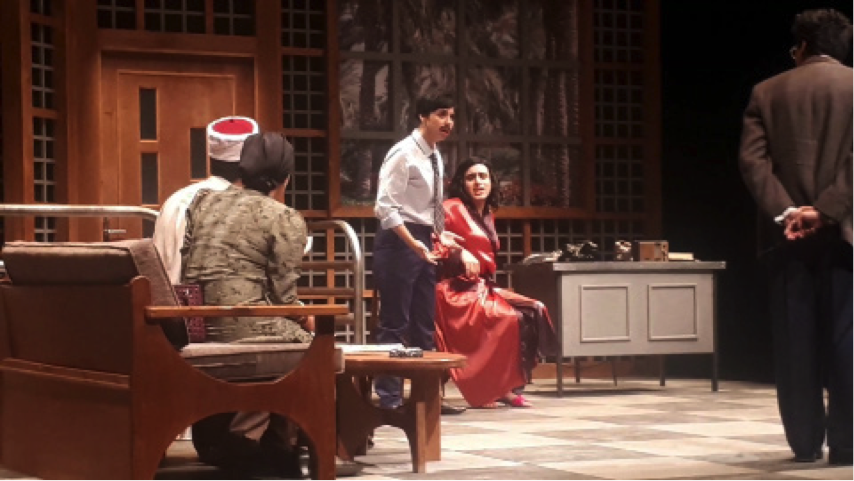An exploration of women’s rights in Egypt in the 1960s, Al Araneb (The Rabbits) creates a unique depiction of the time period and the various conflicts that arose from an increasingly oppressive patriarchal society.
Al Araneb, directed by Mahmoud El Lozy, premiered at the Gerhart Theatre from October 24 until 30.
Set in the 1960s, the play, based on the book by the same name, written by the late Egyptian writer Lotfy El Kholy, follows the life of Osama (Tayam Qamar) and Kismat (Reem Amer), as they navigate through their conflicts in marriage.
Osama believes that women should stay at home and that they don’t have the right to work. He forces Kismat to quit her job only on the basis that they will discuss the issue once more after a six month period.
Qamar’s skilful acting depicted the complex reasonings behind men’s controlling nature at the time. Men did not just want their wives to stand idly by and serve them, they wanted their wives’ lives to be to their advantage, and to use them to facilitate their own lives.
Kismat continued to struggle to convince Osama to let her work, even if it’s without a benefit.
Left with no other option, she decides to work behind his back with the help of Sheikh Maarouf, a religious figure who has no principles and manipulates Islamic scripture in a way that only benefits him, played by engineering student Youssef Amir.
When Osama discovers the secret, tensions between the couple arise once more, and Doctor Younis (Marwan Abdelmoneim), a friend of theirs who had been a witness to their conflicts, steps in with his remedy: the unicism vaccine, a vaccine that switches genders.
The vaccine turned the couple’s life upside down by transforming Osama into a woman and his wife Kismat into a man.
“When I started putting myself in [Kismat’s] shoes, and really focusing on her lines and her words, I realized she is not selfish at all,” Reem Amer, the actress who played Kismat, told The Caravan.
“Her argument [for working instead of being a housewife] was always based on both Osama and her, and because she wanted them to grow together, she was very patient with him,” Amer added.
The audience laughed hysterically when the actors appeared for the first time after the swap, while both Qamar and Amer mastered the role switch by managing to adjust their tones to fit their new gender, resulting in simultaneously comedic and realistic scenes.
“For me, being a man was the most difficult thing. It might be because of how society want women to act or move in a certain way. It was tough as I felt a bit uncomfortable and shy to do this,” explained Amer.
From the makeup and costumes, designed by Professor Jeanne Arnold, to the effective usage of lights and sounds, which were managed by Ahmed Samir Melouk and Lina Sakr, the play’s remarkable details concretized the representation of the characters and their development, and provided a realistic visual of the 1960s in Egypt.
“Watching the play was very interesting for me. This conflict is still present in our society,” GUC Applied Arts student, Deena Deyaa told The Caravan.
According to Deyaa, Al Araneb is a perfect example of a period piece. Every aspect in the play was well detailed, from the choice of the 60’s costumes that fit the characters to the usage of large size paper money to suit the Egyptian currency of the time period.
Al Araneb helps the audience gain an insight on the workings of Egyptian society in the 1960s, and the way men and women’s roles were negotiated and challenged, especially by women, as Kismat showed.
Amer was able to gain sympathy and support from the audience. She showed how Kismat was clever in achieving what she wants patiently and rationally as she resisted the control of her husband in spite of his determination.
While it’s unfortunate to see, as the message of the play entails, that the only way for men to realize that they’re treating women unjustly is through being in their shoes, it’s refreshing to witness a switch in gender roles in today’s theatres.
Qamar and Amer paved their way through their first theatre performance in leading roles, getting the audience to interact with them and with the events of the play, with various crowd reactions echoing in the theatre throughout.
